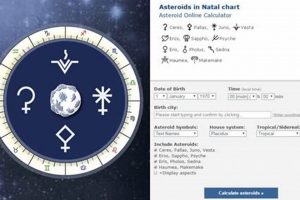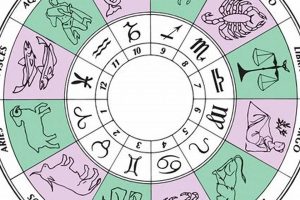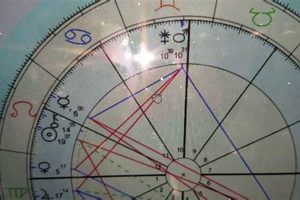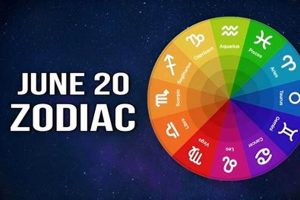In astrological practice, the asteroid Juno represents commitment, marriage, and long-term partnerships. Its placement in a birth chart reveals insights into an individual’s approach to relationships, the qualities they seek in a partner, and the dynamics they tend to create within committed unions. For example, Juno in Libra might suggest a desire for balance and harmony in partnerships.
Understanding this celestial body’s influence provides valuable self-awareness regarding relationship patterns and desires. By analyzing its position and aspects within a natal chart, individuals can gain a deeper understanding of their needs and expectations in partnerships, facilitating more fulfilling and conscious relationship choices. Historically, Juno, named after the Roman goddess of marriage and childbirth, has been linked to themes of devotion, fidelity, and the legal bonds of matrimony.
This exploration will delve further into specific aspects of this astrological influence, including its significance in various zodiac signs and houses, as well as its interplay with other planetary bodies in the birth chart. By examining these facets, a more comprehensive understanding of its impact on interpersonal dynamics can be achieved.
Tips for Understanding Committed Relationships Through Astrological Insight
These tips offer guidance on utilizing astrological principles related to long-term partnerships to foster greater self-awareness and improve relationship dynamics.
Tip 1: Determine Placement: Locate the asteroid’s position in the birth chart to understand its influence on relationship preferences and patterns.
Tip 2: Analyze Aspects: Examine the astrological aspects formed between this asteroid and other planets to gain insight into potential challenges and strengths in committed relationships.
Tip 3: Consider the House Placement: The astrological house in which this asteroid resides provides further context regarding the area of life where commitment themes are most prominent.
Tip 4: Compare Charts: Comparing the placement of this asteroid in two individuals’ charts can offer insights into their compatibility and potential relationship dynamics.
Tip 5: Reflect on Past Relationships: Analyzing the role of this asteroid in past partnerships can illuminate recurring patterns and areas for personal growth.
Tip 6: Integrate with Other Astrological Factors: Consider this asteroid’s influence in conjunction with other planetary placements and aspects for a comprehensive understanding of relationship dynamics.
Tip 7: Utilize Transits and Progressions: Track this asteroid’s transits and progressions to anticipate periods of significant relationship developments or challenges.
By applying these insights, individuals can cultivate greater awareness of their relationship needs and make more conscious choices in their partnerships.
These insights provide a foundation for exploring further dimensions of astrological understanding related to long-term relationships and personal development.
1. Commitment
Within the framework of astrological interpretation, the asteroid Juno holds significant relevance to the concept of commitment. Its placement within a birth chart offers insights into an individual’s approach to long-term relationships, revealing their inherent needs and expectations regarding partnership.
- The Nature of Commitment
Juno’s position illuminates the type of commitment an individual seeks. Some may prioritize legal or social contracts, while others value emotional connection and shared values as the foundation of commitment. Juno in Capricorn, for example, might suggest a preference for traditional, structured commitments, while Juno in Pisces might indicate a desire for spiritual and emotional merging within a partnership.
- Challenges to Commitment
This asteroid can also reveal potential challenges an individual might face in maintaining commitment. Aspects to Juno, such as squares or oppositions, can indicate areas where relationship difficulties may arise. For instance, a challenging aspect between Juno and Uranus might suggest a tendency towards sudden relationship disruptions or a resistance to conventional commitment structures.
- Evolution of Commitment
As individuals mature, their understanding and experience of commitment evolve. Juno’s influence can provide a framework for understanding these shifts in perspective. Transits to Juno can signify periods of significant change or development in committed relationships, offering opportunities for growth and deeper connection.
- Commitment Beyond Romantic Relationships
While often associated with romantic partnerships, Juno’s influence extends to other forms of commitment, including business partnerships, close friendships, and even commitments to creative projects or social causes. Its placement can illuminate the dynamics at play in these various forms of committed relationships.
By analyzing these facets of Juno’s influence, individuals can gain a more nuanced understanding of their approach to commitment, fostering greater self-awareness and promoting more fulfilling relationships. Understanding the nuances of this asteroid’s influence allows for more conscious choices in forming and maintaining lasting connections.
2. Marriage
Within astrological interpretations, the asteroid Juno holds a prominent association with marriage, symbolizing the legal and contractual aspects of committed partnerships. Its placement in a natal chart offers insights into an individual’s expectations and predispositions regarding marriage. Juno’s position can illuminate the qualities sought in a spouse, the potential challenges one might face in marital dynamics, and the overall approach to creating and sustaining a long-term committed relationship. For instance, Juno in Taurus might suggest a desire for stability and security in marriage, while Juno in Gemini might indicate a preference for intellectual connection and communication within the partnership. A challenging aspect between Juno and Saturn could represent potential difficulties with commitment or delays in marriage.
Examining Juno’s aspects and its interplay with other planets in the natal chart offers a deeper understanding of the potential patterns and dynamics within a marriage. For example, a harmonious aspect between Juno and Venus can signify a strong emphasis on love, harmony, and shared values in the marital relationship. Conversely, a challenging aspect between Juno and Mars could indicate potential conflicts or power struggles. Understanding these potential influences provides valuable self-awareness, allowing individuals to navigate their marital relationships with greater consciousness and address potential challenges proactively. Furthermore, comparing the Juno placements in the charts of two individuals can offer insights into their marital compatibility and potential areas of synergy or conflict.
Understanding Juno’s influence offers valuable perspectives on the dynamics of marriage, providing a framework for navigating the complexities of long-term committed partnerships. While Juno offers valuable insights, it’s crucial to remember that astrological interpretations are not deterministic. Free will and individual choices play a significant role in shaping relationship outcomes. Juno’s influence provides a lens through which to understand predispositions and potential patterns, empowering individuals to make conscious choices and cultivate fulfilling, lasting marriages. Integrating this understanding with other astrological factors provides a comprehensive approach to navigating the complexities and rewards of committed partnerships.
3. Long-term partnerships
The asteroid Juno, within astrological frameworks, offers significant insight into the dynamics of long-term partnerships. Its placement in a natal chart illuminates an individual’s predispositions toward commitment, revealing the qualities sought in a partner and the potential challenges one might face in sustaining long-term connections. This influence extends beyond romantic relationships to encompass various forms of committed partnerships, including business collaborations and close friendships. The position of Juno in a specific sign and house provides a nuanced understanding of the individual’s approach to commitment and the areas of life where partnership plays a crucial role. For example, Juno in the seventh house, traditionally associated with partnerships, emphasizes the importance of committed relationships in the individual’s life, while Juno in the eleventh house might indicate a focus on shared goals and community within long-term connections.
Analyzing Juno’s aspects with other planets provides further insights into the potential strengths and weaknesses within long-term partnerships. A harmonious aspect between Juno and Saturn, for example, can suggest stability and enduring commitment, while a challenging aspect between Juno and Neptune might indicate a tendency towards idealization or disillusionment within the partnership. Practical application of this understanding involves recognizing potential relationship patterns and addressing them constructively. For instance, an individual with Juno conjunct Pluto might explore themes of power dynamics and transformation within their long-term relationships, fostering greater self-awareness and promoting healthier relationship dynamics. Examining synastry, the comparison of two individuals’ birth charts, offers insights into the dynamics of their shared Juno placements, potentially illuminating areas of compatibility and potential challenges.
Understanding Juno’s influence provides a valuable framework for navigating the complexities of long-term partnerships. It offers insights into individual needs and expectations, facilitating more conscious choices in selecting partners and fostering healthier relationship dynamics. While Juno’s placement provides valuable information, it does not predetermine relationship outcomes. Individual choices and external factors also play significant roles. Integrating Juno’s insights with other astrological considerations and real-world context offers a comprehensive approach to understanding and nurturing long-term partnerships. This understanding empowers individuals to build stronger, more fulfilling connections based on self-awareness and mutual respect.
4. Relationship Needs
The placement of Juno in a natal chart provides valuable insights into an individual’s core relationship needs. This asteroid’s position signifies the qualities and dynamics one seeks in a committed partnership, highlighting areas of importance for long-term relationship satisfaction. For example, Juno in Cancer may indicate a need for emotional security and nurturing within partnerships, while Juno in Aries might suggest a desire for independence and excitement. Understanding these inherent needs allows individuals to make more conscious choices in partner selection and cultivate relationships that align with their core values. Neglecting these needs, as indicated by Juno’s placement, can lead to dissatisfaction and conflict within partnerships. Consider a scenario where an individual with Juno in Libra consistently chooses partners who prioritize personal ambition over relational harmony. This misalignment can lead to feelings of resentment and disconnect. Recognizing the need for balance and fairness, as highlighted by Juno’s placement, can guide individuals towards healthier relationship dynamics and partner choices. Applying this knowledge promotes relationship satisfaction and personal fulfillment.
Practical application of this understanding involves recognizing one’s own Juno placement and its implications for relationship needs. Individuals can utilize this knowledge to attract partners who fulfill these needs and create relationship dynamics that foster mutual growth and satisfaction. Further exploration of Juno’s aspects provides additional layers of understanding. Challenging aspects to Juno can indicate potential areas of conflict or unmet needs within relationships. For example, a square aspect between Juno and Saturn might manifest as difficulties with commitment or emotional restriction. Addressing these challenges proactively, through open communication and self-awareness, strengthens the foundation of long-term partnerships. Integrating these insights with other relationship indicators within the birth chart provides a comprehensive approach to understanding relationship dynamics.
Understanding the connection between Juno and relationship needs empowers individuals to foster more fulfilling and sustainable partnerships. Addressing these needs proactively through conscious partner selection and open communication enhances relationship satisfaction and personal growth. Challenges arise when these core needs remain unaddressed, leading to potential conflict and dissatisfaction. Integrating this knowledge with other astrological factors and real-world considerations allows individuals to navigate the complexities of relationships with greater awareness and intentionality.
5. Spouse Potential
Within the realm of astrological interpretation, the asteroid Juno offers valuable insights into spouse potential. Its placement in a natal chart signifies the qualities and characteristics an individual consciously and unconsciously seeks in a long-term partner, particularly within the context of marriage. While not deterministic, Juno’s influence provides a framework for understanding relationship preferences and potential compatibility dynamics. Analyzing Juno’s position, aspects, and interplay with other planetary bodies illuminates the potential for a fulfilling and committed partnership.
- Idealized Partner Qualities
Juno’s placement describes the idealized image of a spouse. Juno in Leo, for example, might suggest a preference for a partner who is charismatic, expressive, and generous. Conversely, Juno in Virgo might indicate a desire for a practical, detail-oriented, and supportive spouse. Understanding these inherent preferences provides self-awareness regarding partner selection and relationship expectations.
- Relationship Dynamics
Juno’s aspects reveal potential relationship dynamics within marriage. A harmonious aspect between Juno and Venus might signify a strong emphasis on love, harmony, and shared values. Conversely, a challenging aspect between Juno and Mars could indicate potential conflicts related to assertion and control. Recognizing these potential dynamics allows for proactive navigation of challenges and fostering healthier communication patterns.
- Commitment and Longevity
Juno’s influence speaks to the potential for commitment and longevity in a marital relationship. A strong and well-aspected Juno can indicate a predisposition towards enduring partnerships. However, challenging aspects might suggest difficulties with commitment or recurring relationship patterns. Awareness of these potential challenges empowers individuals to address them consciously and cultivate stronger, more sustainable relationships.
- Evolution and Growth
Juno’s position is not static. Transits and progressions involving Juno can signify periods of significant development and transformation within a marriage. These periods offer opportunities for growth, both individually and as a couple. Understanding these astrological influences allows individuals to navigate these periods with greater awareness and intentionality, fostering deeper connection and mutual understanding within the partnership. For example, a transit of Jupiter over natal Juno could signify a period of expansion and joy within the marriage.
By integrating these facets of Juno’s influence, individuals gain valuable insights into spouse potential and the dynamics of long-term committed partnerships. While Juno offers valuable guidance, individual choices and external factors also contribute to relationship outcomes. Combining astrological insights with self-awareness and open communication empowers individuals to create fulfilling and lasting marriages based on mutual respect and understanding.
6. Jealousy and Possessiveness
Within the framework of Juno astrology, the themes of jealousy and possessiveness emerge as significant considerations. The asteroid Juno, representing commitment and long-term partnerships, can also highlight potential vulnerabilities and challenges related to these emotions. Exploring this connection provides valuable insights into relationship dynamics and potential areas of conflict. Understanding Juno’s influence allows for proactive management of these tendencies, fostering healthier relationship foundations.
- Insecurity and Fear of Loss
Juno’s placement can reveal underlying insecurities and fears related to relationship stability. Individuals may project these insecurities through jealous or possessive behaviors, stemming from a fear of losing their partner or the perceived threat of rivals. For instance, someone with Juno in Scorpio, a sign associated with intensity and possessiveness, might experience heightened jealousy due to a deep-seated fear of betrayal. Recognizing these underlying anxieties allows for addressing the root causes of these emotions, promoting healthier coping mechanisms and reducing the likelihood of destructive behaviors.
- Control and Power Dynamics
Juno’s influence can also illuminate power dynamics within relationships. Jealousy and possessiveness can be manifestations of a need for control, often stemming from feelings of vulnerability or inadequacy. For example, a challenging aspect between Juno and Pluto might indicate power struggles within partnerships, where jealousy becomes a tool for asserting dominance or maintaining control. Understanding these dynamics allows for addressing imbalances within the relationship and establishing healthier boundaries based on mutual respect.
- Past Relationship Patterns
Juno’s placement can reflect past relationship experiences and patterns. Individuals who have experienced infidelity or betrayal in previous relationships might exhibit heightened jealousy or possessiveness in subsequent partnerships. This pattern can emerge regardless of the current partner’s behavior, reflecting unresolved emotional baggage or unresolved trauma. Addressing these past experiences through self-reflection or therapeutic interventions can help break these cycles and foster healthier relationship patterns. Analyzing Juno’s aspects to other planets can provide additional context regarding these patterns.
- The Shadow Side of Commitment
While Juno represents the positive aspects of commitment, it also highlights its potential shadow side. Jealousy and possessiveness can be distorted expressions of commitment, arising from an unhealthy attachment or fear of abandonment. Understanding this duality allows individuals to differentiate between healthy devotion and unhealthy possessiveness, cultivating relationships based on trust, respect, and emotional security. Exploring Juno’s placement in the birth chart provides a framework for recognizing and addressing these shadow aspects constructively.
By exploring these facets of Juno’s influence, individuals can gain a deeper understanding of the complex interplay between commitment, jealousy, and possessiveness. Addressing these underlying emotional dynamics is crucial for fostering healthy, sustainable relationships. Juno’s guidance empowers individuals to navigate these complexities with greater self-awareness and cultivate more fulfilling partnerships based on trust and mutual respect, rather than fear and control. Further exploration of Juno’s interplay with other astrological factors provides a comprehensive understanding of relationship dynamics and potential challenges.
7. Self-worth in partnerships
The asteroid Juno, in astrological contexts, offers valuable insights into the intricate relationship between self-worth and partnerships. Its placement in a natal chart illuminates how an individual’s sense of self-value influences their approach to committed relationships and the dynamics they tend to create within those partnerships. Juno’s influence can manifest in various ways, shaping expectations, boundaries, and the overall experience of intimacy and connection. Exploring this connection provides valuable self-awareness, enabling individuals to cultivate healthier relationship patterns based on mutual respect and personal empowerment.
- Seeking Validation Through Relationships
Juno’s placement can reveal tendencies to seek external validation through partnerships. Individuals may unconsciously tie their self-worth to the success or perceived status of their relationships. This pattern can lead to dependence on partners for emotional affirmation and a fear of relationship dissolution. For instance, someone with Juno in Libra might overly prioritize maintaining harmony within the relationship, even at the expense of their own needs, due to a fear of rejection. Understanding this tendency empowers individuals to cultivate internal validation and establish healthier relationship dynamics based on mutual respect rather than external approval.
- Compromising Values for Connection
Juno’s aspects can highlight potential challenges related to compromising personal values for the sake of maintaining a relationship. Individuals may diminish or suppress aspects of themselves to avoid conflict or perceived rejection. This pattern can erode self-esteem and create resentment over time. For example, a challenging aspect between Juno and Neptune might indicate a tendency toward idealizing partners and overlooking red flags due to a fear of being alone. Recognizing this pattern allows individuals to prioritize their values and establish boundaries that protect their self-worth within partnerships.
- Projecting Insecurities onto Partners
Juno’s influence can manifest as projecting insecurities onto partners. Individuals may misinterpret partner behaviors or project their own fears and anxieties onto the relationship dynamic. This pattern can create unnecessary conflict and strain the connection. For instance, someone with Juno in Capricorn might project their fears of failure onto their partner, leading to criticism and control within the relationship. Developing self-awareness regarding these projections allows individuals to take responsibility for their own insecurities and foster healthier communication patterns.
- Empowerment Through Partnership
Juno’s placement also reveals the potential for empowerment through partnership. When self-worth is grounded in internal validation, relationships can become a source of mutual growth and support. Individuals can experience greater confidence and fulfillment within partnerships that honor their individuality and encourage personal development. For example, someone with Juno in Sagittarius might find empowerment through shared adventures and intellectual exploration within a relationship. Cultivating a strong sense of self allows individuals to attract and maintain partnerships that enhance their overall well-being and contribute to a deeper sense of purpose.
By understanding the complex interplay between Juno, self-worth, and partnerships, individuals can cultivate more fulfilling and sustainable relationships. Addressing underlying insecurities and developing a strong sense of self allows individuals to create connections based on mutual respect, empowerment, and shared growth. This awareness enables individuals to navigate relationship challenges with greater resilience and consciously choose partners who support their journey of self-discovery and personal fulfillment. Integrating these insights with other astrological factors and real-world considerations offers a comprehensive approach to understanding and navigating the complexities of relationships.
Frequently Asked Questions about Juno in Astrology
This section addresses common inquiries regarding the astrological significance of Juno, offering clarity and practical insights for interpreting its influence in birth charts.
Question 1: How does Juno differ from Venus in astrological interpretations?
While both relate to relationships, Venus represents the general principles of love, attraction, and harmony, whereas Juno signifies the dynamics of commitment, long-term partnerships, and marriage. Venus indicates what one finds aesthetically pleasing and how one expresses affection, while Juno reveals the qualities and dynamics sought in a committed union.
Question 2: Can Juno’s placement predict relationship outcomes?
Astrological placements, including Juno’s, offer insights into predispositions and potential patterns, but do not definitively predict relationship outcomes. Individual choices, external circumstances, and the interplay of other astrological factors all contribute to relationship dynamics.
Question 3: How does one determine Juno’s placement in a birth chart?
Juno’s placement requires specialized astrological software or online chart calculators. Accurate birth date, time, and location are essential for generating a natal chart that includes Juno’s position.
Question 4: What does it signify if Juno is retrograde in a birth chart?
Juno retrograde suggests potential internal conflicts or unresolved issues related to commitment and partnership. These individuals may experience delays in marriage or challenges in forming lasting connections. It encourages introspection regarding relationship patterns and underlying emotional dynamics.
Question 5: How does Juno’s influence manifest in different astrological houses?
Juno’s house placement indicates the area of life where commitment themes are most prominent. Juno in the fourth house, for example, might emphasize the importance of family and home within committed relationships, while Juno in the tenth house might prioritize career and public image within partnerships.
Question 6: What resources can one utilize to learn more about Juno in astrology?
Numerous books, articles, and online resources offer in-depth explorations of Juno’s astrological significance. Reputable astrologers and astrological organizations can provide further guidance and personalized interpretations.
Understanding Juno’s influence offers valuable self-awareness regarding relationship dynamics and personal needs within partnerships. Utilizing these insights promotes healthier, more fulfilling connections.
The following sections delve deeper into specific aspects of Juno’s influence within various zodiac signs and astrological houses.
Juno Astrology
This exploration has delved into the significance of the asteroid Juno within astrological practice, highlighting its influence on committed relationships, marriage, and long-term partnerships. From understanding individual relationship needs and spouse potential to navigating the complexities of jealousy, possessiveness, and self-worth within partnerships, the multifaceted nature of this asteroid’s influence has been examined. Its placement in a birth chart, along with its aspects to other celestial bodies, provides valuable insights into an individual’s approach to commitment and the dynamics they tend to create within long-term unions. The exploration has also addressed common questions surrounding its interpretation and practical application, offering a comprehensive understanding of its role in astrological analysis.
The insights offered by Juno astrology provide a framework for deeper self-awareness and conscious relationship building. By understanding this asteroid’s influence, individuals can gain a greater understanding of their own needs and expectations within partnerships, leading to more informed choices and the potential for more fulfilling, sustainable connections. Further exploration and integration of these astrological principles can empower individuals to navigate the complexities of relationships with greater clarity and intention, fostering stronger bonds built on mutual respect, understanding, and personal growth.







